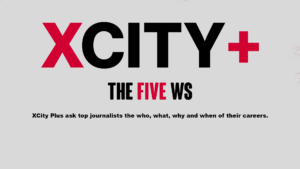
Image: Ben Hunte
The BBC’s first LGBT correspondent and their newest West Africa correspondent has been shortlisted for the XCity Award for his work shedding light on anti-LGBT discrimination.
Ben Hunte, a 2017 graduate of City’s MA Broadcast Journalism course, has been recognised for his reporting on Poland’s ‘LGBT-free’ zones, the lack of health infrastructure for HIV-positive gay and bisexual men In Senegal, as well as rising transphobia and homophobia in the UK.
The XCity Award was founded in 2011 to honour outstanding journalism by former City journalism students – with the winner awarded a £500 prize.
For Mr Hunte, this is his second nomination after being shortlisted for last year’s XCity Award. “Oh, it’s been really great,” said Mr Hunte of his latest nomination. “I massively appreciate the starting steps that City gave me to my journalism career. I will always be indebted to those tutors.”
“I’m very lucky that I have a supportive family, I have a partner, I have a loving adopted puppy who is incredible”
In July 2020 Mr Hunte topped DIVA Magazine’s Pride Power List, beating the likes of Sandi Toksvig and Stephen Fry. As an openly gay Black man in a prominent BBC role, Mr Hunte is frequently the subject of racist and homophobic abuse, and he cites his support network for getting him through it.
“I’m very lucky that I have a supportive family, I have a partner, I have a loving adopted puppy who is incredible,” said Mr Hunte. “I’m only able to do all of this work because I have that safety net in place, especially because of the amount of trauma [I witness] and because the things that I report on are actually related to myself.
“I think it’s hard for many journalists, when you’re doing a patch that’s specifically focussed on the things that your friends and your loved ones are going through. So, by having my safety net, that’s how I do it.”
In spring 2021 Mr Hunte flew to Senegal to report on rising rates of HIV within the country’s gay male community. “The severity is real,” says Mr Hunte of reporting in a tough environment. “The minute I arrived in Senegal, I was immediately contacted by people who had been attacked on the streets for what people say was ‘assumed homosexuality’. It wasn’t even necessarily that they were gay, they just, to someone, looked gay and that was worth them being beaten up.”
“I know there are people in much worse situations who literally cannot survive on a day-to-day basis”
As an openly gay man reporting in countries with high levels of homophobia, Mr Hunte is vulnerable to discrimination, but he remains unfazed. “I went to university in Malaysia, which is a country that doesn’t have LGBT rights – in fact, it’s very much against them. So, I spent four years in a place where I was told I was going to have to be quiet and I wasn’t.
“I’m used to it, it doesn’t hinder me from doing my job and, if anything, it kind of propels me to do more because I know there are people in much worse situations who literally cannot survive on a day-to-day basis.”
As an accomplished multi-hyphenate BBC correspondent before turning 30, Mr Hunte is positive about what lies ahead. “I still have to pinch myself to think that I’m a news correspondent when literally just over four years ago I was an intern working for free and making tea for people,” he says.
“So, it’s been quite a rise, and I’m just really excited for the future.”
Read about the other nominees for the XCity Award here. The winner will be announced tomorrow.













